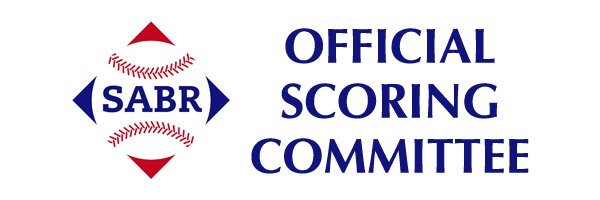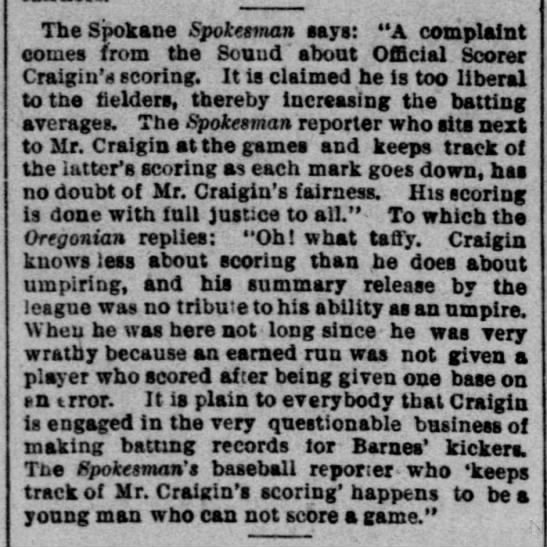SABR Official Scoring Committee: November 2019 newsletter

“You Called That a What . . . ?”
The Newsletter of the Official Scoring Committee
Society for American Baseball Research (SABR)
November 2019, Volume 5, Number 1
Editor:
Stew Thornley
- From the Chair
- Conundrum of the Month (or Quarter or Whatever)
- Profile: Mike Dean
- Bloops and Bobbles
- Honchos
From the Chair
Hi folks,
The 2019 season has wrapped up in good shape for most official scorers. This one was fortunate to not have any scoring decisions overturned by Major League Baseball, five having been appealed. As has been the case since the new review system began in 2012, a lot of calls get submitted by players and teams for review. The method has cut down greatly on the stress in the press box, and team communications representatives, those charged with conveying displeasure to an official scorer, are happy to not be caught in the middle of these disputes anymore.
I can’t say too much about the inner workings of it all, but I will note that all scorers get a chance to look at all plays that are appealed. The report includes the particulars of the play, how the scorer ruled, and why a player or team thinks the call should be changed. There is a link to video of the play, and the report notes if the scoring decision was upheld or overturned. Watching these plays and seeing the final ruling of them has helped all scorers in our primary quest to standardize how calls are made.
We will have a committee meeting next year at the SABR convention, which will be in Baltimore July 15-20.
As usual, keep an eye on our Committee Files page, as the information in there continues to grow.
This issue of “You Called That a What . . . ?” doesn’t have a guest column, but such columns are always welcome as are interviews and profiles of official scorers. If you’re interested in doing either or both, contact me: Stew Thornley.
Conundrum of the Month (or Quarter or Whatever)
No question this time but a follow-up on the Conundrum in the October 2017 newsletter, after Zack Granite hit his first, and still only, major-league home run as a “nothing.”
Mike Anderson noted that a “nothing” occurred in the recently completed World Series. In Game Four, Houston’s Kyle Tucker led off the top of the seventh by hitting for Will Harris. He walked and later scored. Tucker came to the plate again that inning and struck out to end it, this one being as a “nothing.”
With the help of Jacob Pomrenke, Mike came up with two more “nothings.”
In Game Four of the 1929 World Series, when the Athletics overcame a 8-0 Cubs lead with 10 runs in the last of the seventh, George Burns hit for Ed Rommel and popped out. The Athletics were still going when Burns struck out to end the inning.
In Game Six of the 1959 World Series, Don Demeter of the Dodgers ran for Norm Larker in the fourth inning. He later came to bat and grounded out to end the inning.
So three players—Burns, Demeter, and Tucker—have the distinction of ending a World Series inning as a “nothing.”
Profile: Mike Dean
Mike Dean is an official scorer for the West Michigan Whitecaps in the Midwest League and for many years has been the official scorer for the National Baseball Congress World Series. He has also performed the national anthem on his harmonica for the NBC feature games and has been inducted into the NBC Hall of Fame. In 2005 Mike was presented with the Hap Dumond Award, recognizing him for his dedication and love of the NBC World Series. In 2008, he was selected as the first recipient of the Sports Information Director of the Year by the Wolverine-Hoosier Athletic Conference.
Recently, Mike took the time to answer some questions for our newsletter.
How did you get into official scoring?
My circuitous route started (I wanted to get into scoring in high school, but the head coach had his preferences)…with seeing an ad in The Sporting News for the (now-defunct) National Baseball Congress National Association of Scorers in about 1978 that got my attention…but it wasn’t until 1982, after I moved from Detroit to Grand Rapids that the seeds started to take root. That was when I started going to summer league games, which eventually led to working the National Baseball Congress State Tournament that summer. The following summer, I applied for—and got—the announcer/scorer/statistician’s job for that league. The following summer, I went with the Grand Rapids Sullivans to Wichita for the NBC National Tournament, which was the Sullivans’ last NBC title.
From there, rolling ahead to 1994 and the formation of the West Michigan Whitecaps. But that is another story….
What interesting situations have you encountered while scoring?
Nothing really comes well to mind … unfortunately (I hope to revisit this one….)
Highlight of the scoring career: the year (2006?) when the Whitecaps played Fort Wayne at Comerica Park, and I got to do the scoring from the press box and perform the National Anthem on the field.
What advice do you have for people interested in official scoring?
Get a copy of the rule book for the level you are interested in to learn the scoring rules and how to apply them.
Watch games (in person or on television).
Get to know other people who score and hang out with them…
Lastly, volunteer your time.
My scoring philosophy:
I do not want to be required to score to primarily favor one team.
I need to score each play on its own merit or demerit. While a different angle may help evaluate a play, that angle must not be the standard angle to go by, or there is no point in being in the press box.
A ruling needs to stand regardless of what follows next. I do not like it when succeeding events determine a previous play. If a play is ruled a hit or an error, I don’t want to have to change it based on the possible effect(s) on earned runs or hitting streaks. The call needs to stand on its own merits, otherwise, there is no point in having an official scorer.
The scorer is willing to listen to a manager’s view, as a matter of respect and courtesy, but the scorer is not willing to change a call by a manager’s or coach’s fiat or declaration (e.g., “that play should/must be … ” must not or ought not to be an acceptable reason).
The concept that the value of a play is dependent on earned-run considerations must not drive a scoring decision (the concept that a certain play would be accepted as a hit if no earned runs are involved or accepted as an error if earned runs ought not/must not—nor forced upon—a scorer, because that would be inconsistent with sound scoring practices, and the scorer would be right to expect to see a play scored in a similar matter); because if a scorer will not be as fair as possible to both teams, the scorer cannot be fair to anyone.
Please do not — annoy, torment, pester,plague, molest, worry, badger, harry, harass, heckle, persecute, irk, bullyrag, vex, disquiet, grate, beset, bother, tease, nettle, tantalize, or ruffle — the scorers while the game is in progress.
Thank you.
Bloops and Bobbles
Gene Gomes found this gem in the August 11, 1890 Seattle Post-Intelligencer:
Jason Lee has a story from 2016 as the official scorer for the Frederick Keys of the Carolina League. On August 3 Trevor Clifton of the Myrtle Beach Pelicans took a no-hitter into the last of the eighth. With one out, Erick Salcedo of the Keys hit a grounder to the right side that hit the runner, Aderlin Rodriguez. By rule, Salcedo was credited with a hit. Fortunately, it wasn’t the first hit; Jomar Reyes had led off the inning with a double. One of an official’s scorers nightmares is to have a no-hitter broken up by a runner being hit by a batted ball and to imagine the howls after the announcement of a hit. Fortunately for Jason, this rare event resulted in the second hit of the game.
Southern League official scorer Howard Runyon Jr. (with the Chattanooga Lookouts) enjoys all the aspects of his job so much that he keeps score of past games from old radio broadcasts, which are available from Classic Baseball Radio Broadcasts. Howard says, “The 1934 All Star game broadcast was so interesting because to my knowledge it is the only broadcast available where Babe Ruth plays in the game. The Hall of Fame may have a couple more but that game is the only game I have found where he plays. He is older but he starts in RF and actually scores a run in that game. Its almost as if you are there while you are scoring it.”
Honchos
Stew Thornley—(Chair and Newsletter Editor)
Marlene Vogelsang—(Vice Chair)
Gabriel Schechter—(Vice Chair)
Bill Nowlin—(Vice Chair)
Sarah Johnson—(Vice Chair)
John McMurray—(Vice Chair and Liaison to the Oral History Research Committee)
Art Mugalian—(Assistant to the Traveling Secretary)



